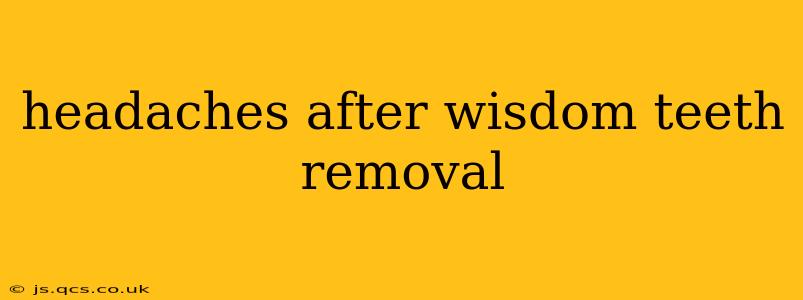Wisdom teeth removal is a common procedure, but it often comes with some post-operative discomfort. Headaches are a frequent complaint following this surgery, and understanding their causes and how to manage them is crucial for a smoother recovery. This comprehensive guide will address common concerns and provide valuable information to help you navigate this challenging period.
What Causes Headaches After Wisdom Teeth Removal?
Several factors can contribute to headaches after wisdom teeth extraction. The most common causes include:
-
Pain medication: While pain relievers are essential for managing post-surgical pain, some can cause headaches as a side effect. This is particularly true with certain NSAIDs (non-steroidal anti-inflammatory drugs) or even over-the-counter analgesics if taken in excess.
-
Inflammation and swelling: The surgical site naturally swells after wisdom teeth removal. This inflammation can put pressure on surrounding nerves and tissues, leading to headaches, particularly in the temporal region (sides of the head).
-
Dry socket: A dry socket, or alveolar osteitis, occurs when the blood clot protecting the extraction site dislodges or dissolves prematurely. This exposes the underlying bone and nerve endings, resulting in significant pain, often radiating to the head and causing intense headaches.
-
Sinus infection: The upper wisdom teeth are located close to the maxillary sinuses. During extraction, these sinuses can be affected, leading to sinus pain and headaches.
-
Medication interactions: Certain medications taken before or after surgery can interact and cause headaches. Always inform your dentist or oral surgeon of all medications you are currently taking, including over-the-counter drugs and supplements.
-
Stress and anxiety: The anticipation and stress surrounding the surgery itself can contribute to headaches.
How Long Do Headaches Last After Wisdom Teeth Removal?
The duration of post-wisdom tooth extraction headaches varies greatly depending on individual factors and the complexity of the procedure. Mild headaches often subside within a few days with proper pain management. However, severe or persistent headaches that last longer than a week warrant a call to your dentist or oral surgeon.
How Can I Relieve Headaches After Wisdom Teeth Removal?
Several strategies can help alleviate headaches after wisdom teeth removal:
-
Follow your dentist's instructions: This is paramount. Adhere strictly to post-operative care instructions regarding medication, diet, and oral hygiene.
-
Over-the-counter pain relievers: Your dentist might recommend acetaminophen (Tylenol) or ibuprofen (Advil, Motrin) to manage pain and inflammation. Always follow the recommended dosage.
-
Ice packs: Applying ice packs to the affected area can help reduce swelling and alleviate pain. Use ice packs for 15-20 minutes at a time, several times a day.
-
Rest: Ample rest is crucial for healing. Avoid strenuous activities and get plenty of sleep.
-
Gentle massage: Gently massaging the temples or jaw can sometimes help relieve tension headaches.
-
Hydration: Drink plenty of fluids, especially water, to stay hydrated and support the healing process.
What Kind of Pain Relievers Are Best for Post-Wisdom Tooth Extraction Headaches?
Your dentist will usually prescribe or recommend specific pain relievers. Generally, acetaminophen is preferred for headaches not associated with significant inflammation, while ibuprofen is more effective for pain and inflammation. Never exceed the recommended dosage, and always consult your dentist or pharmacist if you have any questions.
When Should I See a Doctor About Headaches After Wisdom Teeth Removal?
Contact your dentist or oral surgeon immediately if you experience:
-
Severe or persistent headaches: Headaches that don't improve with over-the-counter pain relievers or that worsen over time require professional attention.
-
High fever: A high fever could indicate an infection.
-
Excessive swelling or bleeding: Uncontrolled swelling or bleeding is a cause for concern.
-
Signs of infection: These include redness, pus, increased pain, or foul odor from the extraction site.
-
Numbness or tingling: Numbness or tingling in the face or jaw could indicate nerve damage.
By understanding the potential causes of headaches following wisdom teeth removal and adopting appropriate management strategies, you can significantly improve your post-operative experience and ensure a swift recovery. Remember, always consult your dentist or oral surgeon if you have any concerns. They are the best resource for personalized advice and treatment.
